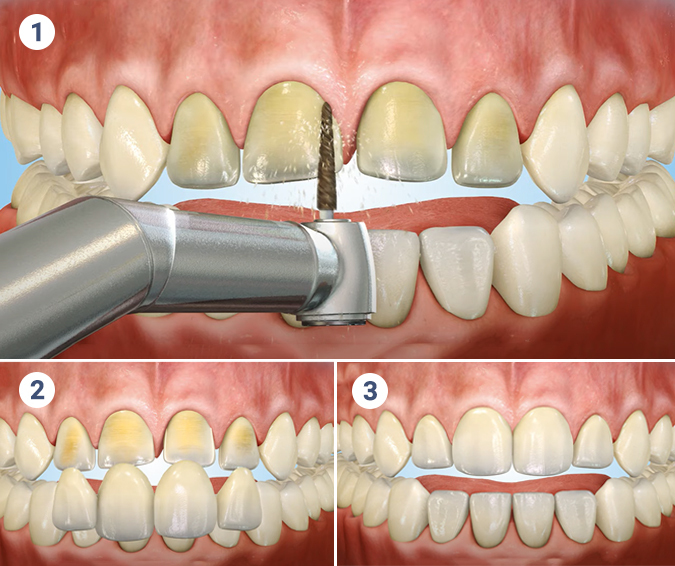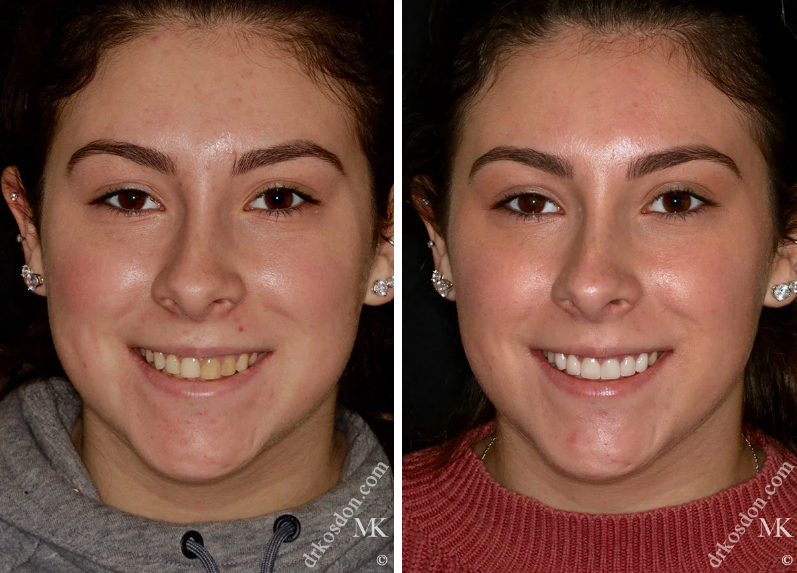5 Key Facts About What Are Veneers You Must Consider
Wiki Article
The Full Overview of Veneers: Kinds, Uses, and Their Effect on Your Smile
Veneers act as a preferred service for people seeking to improve their dental aesthetic appeals. These custom-crafted coverings can efficiently mask blemishes such as discoloration and spaces. With 2 main kinds available, porcelain and composite resin, each deals distinct advantages and constraints. The impact of veneers prolongs past simple look, affecting self-confidence and social communications. Understanding their types and advantages is necessary. What might this imply for one's general top quality of life?Understanding Veneers: What They Are and How They Function
Veneers are slim coverings, normally made from porcelain or composite resin, that are custom-crafted to fit over the front surface of teeth. They serve both visual and functional purposes, offering a remedy for various dental flaws such as discoloration, spaces, and small imbalances. By sticking to the tooth enamel, veneers develop a natural look while improving the form and shade of the teeth.The procedure usually entails a preliminary examination, where a dental expert analyzes the patient's requirements and reviews wanted end results - Veneers Teeth. Following this, a minimal quantity of enamel may be gotten rid of to accommodate the veneer. Impacts of the teeth are then taken to assure an exact fit. Once fabricated, the veneers are adhered safely to the teeth utilizing an unique dental adhesive. This procedure not only improves the smile's look yet additionally aids secure the underlying teeth from more damages, making veneers a popular choice for several looking for a smile makeover
Kinds of Veneers: Porcelain vs. Composite Resin
The difference between porcelain and composite resin veneers depends on their material composition and features. Each type provides varying levels of resilience, durability, and cost, affecting patients' options based upon their specific requirements. Recognizing these differences is crucial for making a notified choice concerning oral improvements.Material Distinctions Discussed
While both porcelain and composite material veneers offer the same cosmetic function, they vary significantly in product homes, longevity, and aesthetic results. Porcelain veneers are crafted from a ceramic product that resembles the natural translucence of teeth, supplying a lifelike appearance. Their smooth surface is immune to staining, making them an attractive alternative for those looking for a long-lasting visual. On the other hand, composite resin veneers are made from a tooth-colored plastic material, using adaptability and convenience of application. Nonetheless, they may not achieve the same degree of brightness or clarity as porcelain. Furthermore, composite veneers can be a lot more quickly formed and repaired, making them an extra adaptable alternative in particular oral circumstances. Each type provides special advantages tailored to private preferences.Longevity and Toughness
Long life and sturdiness are significant elements when comparing porcelain and composite material veneers. Porcelain veneers are understood for their strength, usually lasting 10 to 15 years with appropriate care. Their resilience versus damaging and staining makes them a favored choice for people looking for lasting results. In contrast, composite material veneers commonly have a much shorter lifespan, balancing 5 to 7 years. While they can be repaired much more easily if harmed, they are a lot more vulnerable to put on and staining over time. The selection between these materials often relies on the individual's way of living, aesthetic objectives, and maintenance choices. Ultimately, recognizing the distinctions in longevity and longevity can lead clients in selecting the veneer type that finest matches their demands.Expense Contrast Insights
Expense is an essential factor to consider when selecting in between porcelain and composite resin veneers. Porcelain veneers commonly range from $800 to $2,500 per tooth, showing their resilience, aesthetic allure, and resistance to staining. These veneers need an extra comprehensive treatment and specialized laboratory work, adding to their greater cost. In contrast, composite material veneers are generally much more economical, setting you back in between $250 and $1,500 per tooth. They can be applied in a single check out, which minimizes labor prices. However, composite veneers may require extra constant replacements, potentially enhancing long-lasting expenses. Inevitably, the choice in between porcelain and composite material veneers relies on specific budgets and desired outcomes, balancing initial costs versus durability and aesthetic results.The Benefits of Choosing Veneers for Your Smile
Choosing veneers offers significant benefits for those looking for an improved smile. Their boosted aesthetic charm can change the look of teeth, while their stain-resistant residential properties guarantee a long lasting brightness - Porcelain Veneers. This mix makes veneers a prominent choice for people seeking to accomplish a remarkable smileEnhanced Aesthetic Appeal
When individuals seek to improve their smiles, veneers typically become a favored service because of their transformative aesthetic advantages. These slim coverings, usually made of porcelain or composite material, can efficiently conceal blemishes such as chips, spaces, and misalignment. By resembling the all-natural appearance of teeth, veneers provide a smooth, glowing smile. Their adjustable nature enables for a tailored technique, allowing people to select tones and shapes that ideal fit their facial attributes. Furthermore, veneers can create an uniform look, enhancing total facial symmetry. This visual enhancement not just boosts self-confidence but can likewise favorably influence personal partnerships and social interactions, making veneers a preferred choice for those seeking to achieve a brighter, much more eye-catching smile.Stain Resistance Conveniences
Veneers not only improve visual appeal however additionally use significant tarnish resistance, making them an click this link attractive choice for people worried about preserving an intense smile. Made up of resilient materials such as porcelain or composite material, veneers are much less porous than all-natural teeth, which aids avoid the absorption of spots from typical wrongdoers like coffee, tea, and merlot. This fundamental discolor resistance permits people to enjoy their favorite beverages without fretting regarding staining. Porcelain Veneers Dentist. Additionally, the smooth surface of veneers more info here makes them simpler to clean, additional boosting their long life and keeping their pristine appearance. Therefore, veneers supply a useful option for those seeking both charm and performance in their oral treatmentThe Process of Obtaining Veneers: What to Anticipate

The procedure of getting veneers might appear intimidating, recognizing the actions involved can alleviate concerns. An assessment with a dental professional is required to determine if veneers are the ideal remedy for the individual's dental concerns. During this visit, the dental expert will discuss wanted results and take impressions of the teeth.
Next off, a second appointment is set up for tooth preparation, where a tiny quantity of enamel is usually removed to suit the veneers. Short-term veneers may be put while the customized ones are crafted in an oral lab, which generally takes a number of weeks.
Once prepared, the dental professional will certainly place the veneers, guaranteeing correct fit and color prior to bonding them to the teeth using an unique adhesive. After final changes, the dental professional will provide advice on care. Understanding these actions can assist patients feel extra comfy and educated throughout the veneer procedure.
Maintenance and Care for Your Veneers
Preserving veneers requires consistent care to ensure their longevity and look. Proper oral hygiene is important; cleaning two times daily with a non-abrasive toothpaste and flossing consistently help avoid plaque accumulation around the veneers. Additionally, regular dental examinations are vital for monitoring the condition of the veneers and attending to any kind of potential problems early.When biting to stop damage, clients must prevent difficult foods and too much pressure. It's likewise a good idea to restrict usage of discoloring substances, such as coffee, tea, and red wine, as these can affect the veneers' color over time.

Transforming Your Smile: Real-Life Impact of Veneers
A radiant smile can substantially enhance one's confidence and general look. For several people, veneers work as a transformative solution, efficiently attending to numerous oral problems such as staining, voids, and imbalance. These slim coverings, tailor-made to fit over the front of the teeth, can produce a harmonious and aesthetically pleasing smile.Real-life cases highlight the extensive effect veneers can have. Individuals typically report an instant boost in self-esteem and social communications following their treatment. The newfound confidence can lead to even more possibilities in expert and personal life, as individuals feel more likely to involve and share themselves.
Furthermore, the mental benefits extend past simple look; several experience enhanced mental health as they accept their smiles. Consequently, veneers not just enhance physical attributes yet also add considerably to general top quality of life, highlighting their value in aesthetic dentistry.
Often Asked Questions
The Length Of Time Do Veneers Typically Last Before Requiring Replacement?
Veneers normally last between 10 to 15 years before calling for substitute. Factors such as oral health, oral practices, and the sort of material utilized can affect their longevity and general resilience. Routine oral check-ups are a good idea.Can Veneers Be Removed, and if So, How?
Yes, veneers can be eliminated. A dental professional commonly uses specialized tools to thoroughly remove them from the teeth, making certain minimal damage to the underlying enamel, typically adhered to by essential adjustments or remediations for optimal visual appeals.Are Veneers Suitable for Everybody's Dental Problem?

Will Getting Veneers Hurt or Require Anesthetic?
Getting veneers usually entails very little discomfort, and many patients obtain local anesthesia to ensure a pain-free experience. Sensitivity may happen momentarily later, but a lot of locate the process bearable and are pleased with the results.Just How Do Veneers Affect Tooth Sensitivity After Placement?
Veneers can briefly enhance tooth sensitivity as a result of the elimination of enamel and the bonding procedure. Most individuals experience a reduction in level of sensitivity with time as the teeth adjust to the brand-new veneers.Veneers are slim coverings, typically made from porcelain or composite resin, that are custom-crafted to fit over the front surface of teeth. Porcelain veneers are crafted from a ceramic material that simulates the all-natural transparency of teeth, giving a natural look. Porcelain veneers typically range from $800 to $2,500 per tooth, showing their resilience, visual allure, and resistance to discoloration. In contrast, composite resin veneers are typically extra affordable, setting you back in between $250 and $1,500 per tooth. Made up of sturdy products such as porcelain or composite material, veneers are much less permeable than natural teeth, which helps protect against the absorption of spots from common offenders like coffee, tea, and red wine.
Report this wiki page